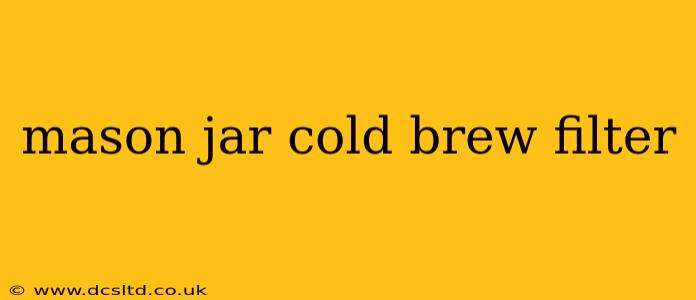Cold brew coffee has taken the world by storm, and for good reason. Its smoother, less acidic profile makes it a delightful alternative to traditional hot-brewed coffee. But achieving that perfect cold brew requires the right equipment, and a mason jar cold brew filter is a popular and affordable choice. This guide will explore everything you need to know about using mason jars and filters for crafting the ultimate cold brew experience at home.
What is a Mason Jar Cold Brew Filter?
A mason jar cold brew filter isn't a specific product, but rather a method. It utilizes a standard mason jar and a filter to steep coffee grounds in cold water. The filter, which can be a variety of materials (we'll discuss these below), prevents grounds from entering your final brew, resulting in a clean, sediment-free cup. The simplicity and affordability of this method make it incredibly popular among cold brew enthusiasts.
What Kind of Filter Should I Use for My Mason Jar Cold Brew?
Choosing the right filter is crucial for a successful cold brew. Several options exist, each with its own pros and cons:
Nylon Mesh Filters: These are widely available and inexpensive. They're durable and easy to clean, making them a great starting point. However, they can sometimes let very fine coffee particles through.
Cheesecloth: A readily accessible option, cheesecloth provides a fine filtration. However, it can be more challenging to clean thoroughly and might require multiple layers for optimal results.
Coffee Filters: Standard paper coffee filters can be used, but they tend to slow down the brewing process considerably and can sometimes tear. They are also not reusable.
Reusable Coffee Bags: Similar to tea bags, these are specifically designed for cold brewing and offer excellent filtration and easy cleanup. They are a more sustainable option than disposable filters.
How Do I Make Cold Brew Coffee Using a Mason Jar and Filter?
Making cold brew in a mason jar is straightforward. Here's a step-by-step guide:
- Grind your coffee: Use a coarse grind, similar to coarse sea salt. Finer grinds will lead to over-extraction and bitterness.
- Choose your filter: Select your preferred filter method (nylon, cheesecloth, etc.) and prepare it according to the manufacturer's instructions.
- Combine coffee and water: Add your coarse coffee grounds to the filter, then place it inside your mason jar. Slowly pour cold, filtered water over the grounds, ensuring they're fully saturated. A common ratio is 1:8 coffee-to-water (e.g., 1 cup of grounds to 8 cups of water), but you can adjust this to your taste.
- Steep: Cover the jar and refrigerate for 12-24 hours, depending on your desired strength. The longer it steeps, the stronger the brew will be.
- Filter: Once steeped, carefully remove the filter and grounds. If using cheesecloth, you might need to gently squeeze out any remaining liquid.
- Dilute (optional): Many people dilute their cold brew with water, milk, or other additions to adjust the strength to their preference.
How Long Does Cold Brew Coffee Last in the Fridge?
Properly stored cold brew coffee can last in the refrigerator for up to two weeks. Make sure to store it in an airtight container to maintain freshness and prevent unwanted flavors from developing.
What are the Benefits of Using a Mason Jar for Cold Brew?
Mason jars offer several advantages for cold brewing:
- Affordability: Mason jars are inexpensive and readily available.
- Durability: They're sturdy and can withstand the rigors of cold brewing.
- Visibility: You can easily monitor the brewing process through the clear glass.
- Versatility: They're suitable for various filter types.
Can I use any type of mason jar for cold brew?
While most mason jars are suitable, opt for those with a wide mouth for easier access to the grounds and filter. Also, ensure the lid creates an airtight seal to prevent spills and maintain freshness.
What are some tips for making the best mason jar cold brew?
- Use high-quality coffee beans: The quality of your beans significantly impacts the final taste.
- Experiment with different coffee-to-water ratios: Find the ratio that best suits your taste preferences.
- Don't over-steep: Over-steeping can result in a bitter brew.
- Keep it clean: Clean your mason jar and filter thoroughly after each use.
By following these tips and choosing the right filter for your mason jar cold brew, you can enjoy a consistently smooth, delicious cold brew coffee at home. Remember, experimentation is key to finding your perfect cold brew recipe!
